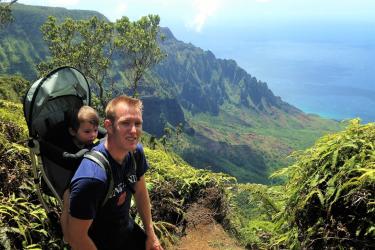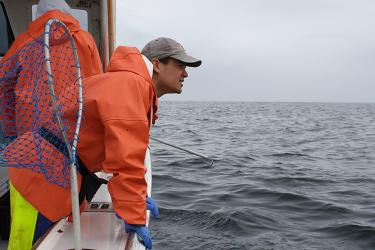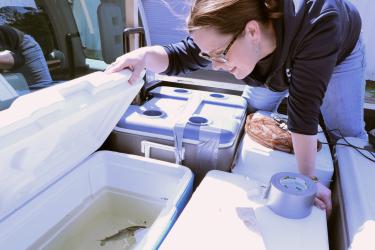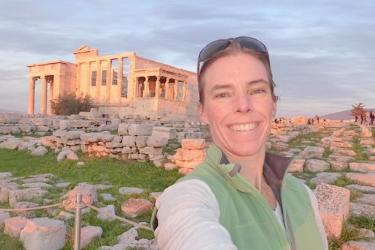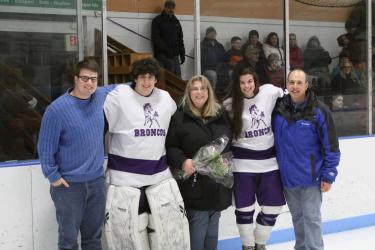Faces of the Northeast Fisheries Science Center
Our series to introduce the people who work at our science center. Staffers share a bit about who they are, their work, and what they enjoy doing in their spare time.
Isaiah Mayo
Biological Science Technician
I love learning about the projects that I’m involved with and being able to work with such passionate researchers. The staff here at the Milford Lab encourage a learning environment where I can ask hundreds of questions and get hundreds of answers.
Darius Johnson
Academic Programs Office Coordinator
You have to prepare for the questions you will get from students. I enjoy finding answers for students and helping them get the most out of their internship experience. It’s clear from my conversations with students that they appreciate the time, care, and attention our staff gives them during and after their internship with us. This includes letters of recommendation, resume guidance, and potential career opportunities.
Sheila Stiles
Research Geneticist
I am a research geneticist and a project leader. My current research focuses on mussels and encompasses three components: breeding, molecular genetics using DNA/RNA analysis, and field evaluations for stock restoration and analysis.
Audy Peoples
Fish Biologist
My love for the sea was developed early on, having grown up around the water. In grade school when my peers aspired to be police officers and astronauts, my dream was always to study the ocean. Having a job with the federal government could be considered the American dream. My desire to be a marine scientist at NOAA was the obvious goal.
Kate Zewinski
Cooperative Shark Tagging Program
Having grown up in a commercial fishing family, I've always felt connected to science and fisheries. During my early years at the lab I assisted the tagging program as needed. When I returned in 2016 as a contractor to work directly with the program, I was amazed to see there were active volunteers whose names I still recognized. To see that people cared so much to stay part of something for so long really says a lot.
Meghana Parikh
Research Veterinary Medical Officer
I first learned about aquaculture during an aquatic veterinary course I took through Cornell University in Bristol, Rhode Island. My interest in aquaculture grew, as it plays a significant role in meeting global protein demand. I always wanted to work at the population level—individual medicine never quite clicked. I take a “one health” approach to my work, which acknowledges that animal, human, and environmental health are all connected. In order to solve large challenges, we need to consider the interrelatedness of these different areas and cross boundaries to work together. Aquaculture allowed me to span all three of these areas.
Kiersten Curti
Research Fishery Biologist
I have always enjoyed the STEM fields, but what drew me to fisheries science was its applied nature and relevance. It is not just science that is driven by curiosity, but science that is driven by an explicit need and has a direct impact. Fisheries are important as a sustainable food source and as an economic sector supporting coastal communities and people’s livelihoods. I find population dynamics to be a continual challenge and a field where there is never a shortage of opportunities for learning and professional growth. Sometimes it can be overwhelming—there is always so much that you don’t know—but it also keeps it interesting. Within the trenches of population dynamics, I especially enjoy coding and learning new programming languages. I enjoy applying them to current questions, problems, and projects that we have in our branch.
Dave Packer
Research Ecologist
My biggest and most thrilling ongoing project is to map, survey, and characterize deep-sea coral habitats off the U.S. Northeast coast. This involves a lot of fieldwork with other NOAA and academic partners on NOAA’s big white ships and other vessels. We use all kinds of camera and video platforms, like drop cameras, remotely operated vehicles, and autonomous underwater vehicles.
Harvey Walsh
Fishery Biologist
I now lead the EcoMon program, which means I spend a lot of time coordinating with partners from other NOAA programs, government agencies, and universities. We collect data to help manage the ocean’s resources. We use our ship time and partnerships to collect a lot of different kinds of data to improve our understanding of the changes we are seeing in the ecosystem. We can also work with our science and management partners on how those changes impact fish and fishermen.
Vincent Saba
Fisheries Biologist
Working for the center's Ecosystems Dynamics and Assessment Branch allows me to work with a multidisciplinary group of scientists. They assess all components of the marine ecosystem, from physics to primary producers to keystone predators. I also really enjoy working at a world-recognized climate modeling lab. I can work with leading experts to apply state-of-the-art global climate models to regional ecosystem, fisheries, and protected species research here in the Northeast.
Glenn Chamberlain
Lead Assistant
My position has grown since joining the branch ten-plus years ago. It affords me the opportunity to engage in a number of different projects and tasks. They range from writing funding proposals to spending time at the docks catching up with vessel owners and captains. I help administer programs for fishery-dependent data collection. I support our observers, at-sea monitors, and portside samplers in the field as they deploy on vessels from Maine to North Carolina.
Kwanza Johnson
Academic Programs Coordinator
I am the Academic Programs Coordinator. My priorities are to help organize, plan, manage and develop center-wide student programs. I have been involved with NOAA’s Ernest F. Hollings undergraduate scholarships, Educational Partnership Program undergraduate scholarships, and Experiential Research & Training Opportunities. Locally, I have also been involved with NOAA’s Cooperative Institute for the North Atlantic Region, hosted at Woods Hole Oceanographic Institution, NOAA Fisheries’ Woods Hole Science Aquarium, and PEP.
Peter Chase
Ecosystems Survey Branch
Over the past 19 years I have been involved in many of our surveys, from planning and coordination to staging vessels and going to sea. As branch chief and supervisor, I spend a lot of time on tasks related to budget, planning, hiring, communicating with partners and stakeholders. Most importantly, I support the needs of my branch’s programs and staff as much as I can.
Marija Grange
Administrative Assistant
Our office is unique in that we also house team members from the Greater Atlantic Regional Fisheries Office and the NOAA Restoration Center. I do a combination of things, from running the office to serving as the inventory contact, timekeeper, and travel arranger. I am the face of the office when you first arrive.
Katie Burchard
Operations Specialist
One priceless aspect of my job is the collaborative nature of the work. I’m not only part of a cooperative research team, but also work collaboratively across the Science Center and with industry partners. Another great aspect of my job is that I work in a lot of different areas including administrative, project management, data management, and outreach.
Lisa Guy
Algal Culture Curator
I love that I am working at the “center of the algal universe” and for the “algae guru” (as my former supervisor referred to Dr. Gary Wikfors). It’s amazing to work for the same laboratory that I held in such high regard for their starter cultures, and now I’m the one that is able to provide those to others.
Zach Fyke
Observer Compliance Liaison
“Observers can spend days or weeks aboard commercial fishing vessels, and the work is intense,” Fyke said. “Conditions may be uncomfortable. Long trips in close quarters and the observer’s role in monitoring compliance can sometimes lead to tensions on a vessel. That is where I come in.”
Shannon Meseck
Research Chemist
During the interview I remember thinking “I want to be able to apply my chemical knowledge of the environment to help with aquaculture and fisheries issues.” I was offered the job the week of my Ph.D. defense and immediately accepted!
Giovanni Gianesin
Field Scientist
My cooperative research position gives me the opportunity to do lots of different tasks on any given day. During October and May, I spend a lot of time at sea staffing the Bottom Longline Survey.
Henry Milliken
Research Fisheries Biologist
Recently I applied for and accepted a supervisory position within the Protected Species Branch at the Center as Populations, Ecology, and Threats Team lead. A large part of my job now is to help those around me succeed.
Alison Brodet
Woods Hole Science Aquarium Biologist
I’m currently an aquarium biologist at the Woods Hole Science Aquarium. This title is broad and covers various responsibilities, always keeping me on my toes! Similar to Cape Cod itself, my job tends to fluctuate with the seasons.
Amanda Plantamura
Administrative Specialist
I primarily support EAD but also the Center's Operations, Management and Information Division and Data Management Systems, as well as staff from the Greater Atlantic Regional Fisheries Office and from Rutgers University who work here at the Lab.
Larry Alade
Research Fisheries Biologist
My primary role as research fisheries biologist is to investigate and develop scientific tools to assess the health of fish populations in the region to inform and advise the federal fishery management process.
Calvin Alexander
Study Fleet Field Scientist
I am a field scientist based out of the Narragansett Lab in Narragansett, Rhode Island. I’m part of a team that work with our contracted study fleet and partner institutions.
Tammy Murphy
Economist
My time is split between fisheries management support, data collection, and primary research. All of this work has the goal of being able to predict the economic and social impacts of fisheries management decisions on fishing communities.
Julie Rose
Research Ecologist
I am a Research Ecologist at the Science Center's Milford Lab in Milford, Connecticut. I conduct applied research related to shellfish aquaculture.
Follow Julie's scientific journey
Sarah Gaichas
Research Fishery Biologist
I do research in two general categories: integrated ecosystem assessment and management strategy evaluation. Both are processes to help managers achieve their objectives while looking at a wide range of ecological factors and uncertainties.
Mike Jech
Research Fisheries Biologist and Underwater Acoustics Researcher
I work primarily with active underwater acoustics. That’s where we use electronic instruments - echosounders - to transmit pulses of sound and then listen for the echoes that return from many different things in the ocean.
Lisa Natanson
Research Fish Biologist, Apex Predators Program
In the Program we study the life history and movements of sharks. I am a research scientist and my main focus is shark ageing and reproduction. I try to determine shark age at different life stages, when they reproduce, how many young they have, and overall how long they live.
Karen Tougas
Administrative Support Assistant
I am an administrative support assistant (ASA) for the Narragansett Laboratory in Rhode Island. My position is with the Apex Predators Program (APP) in the Population Biology Branch, part of the Center’s Population & Ecosystems Monitoring & Analysis Division.
John Rosendale
Marine Biological Sciences Laboratory Technician
My position is formally known as a Marine Biological Sciences Laboratory Technician. I work in the Fisheries Ecology Branch, part of the Center's Ecosystems & Aquaculture Division, at the Howard Laboratory.
Read John's story
John Kocik
Task Chief, Atlantic Salmon Research Team
I wear several hats in my job. As a Supervisory Research Fishery Biologist, I am a player-coach. My recent efforts involved working with larger inter-agency teams to foster a better understanding of telemetry as a research tool and climate impacts on fish population productivity.
Jarita Davis
Technical Writer-Editor
I am a science editor. I spend much of my day revising research papers to ensure clear organization, logic continuity, correct use of language, and resolution of contradictions.










